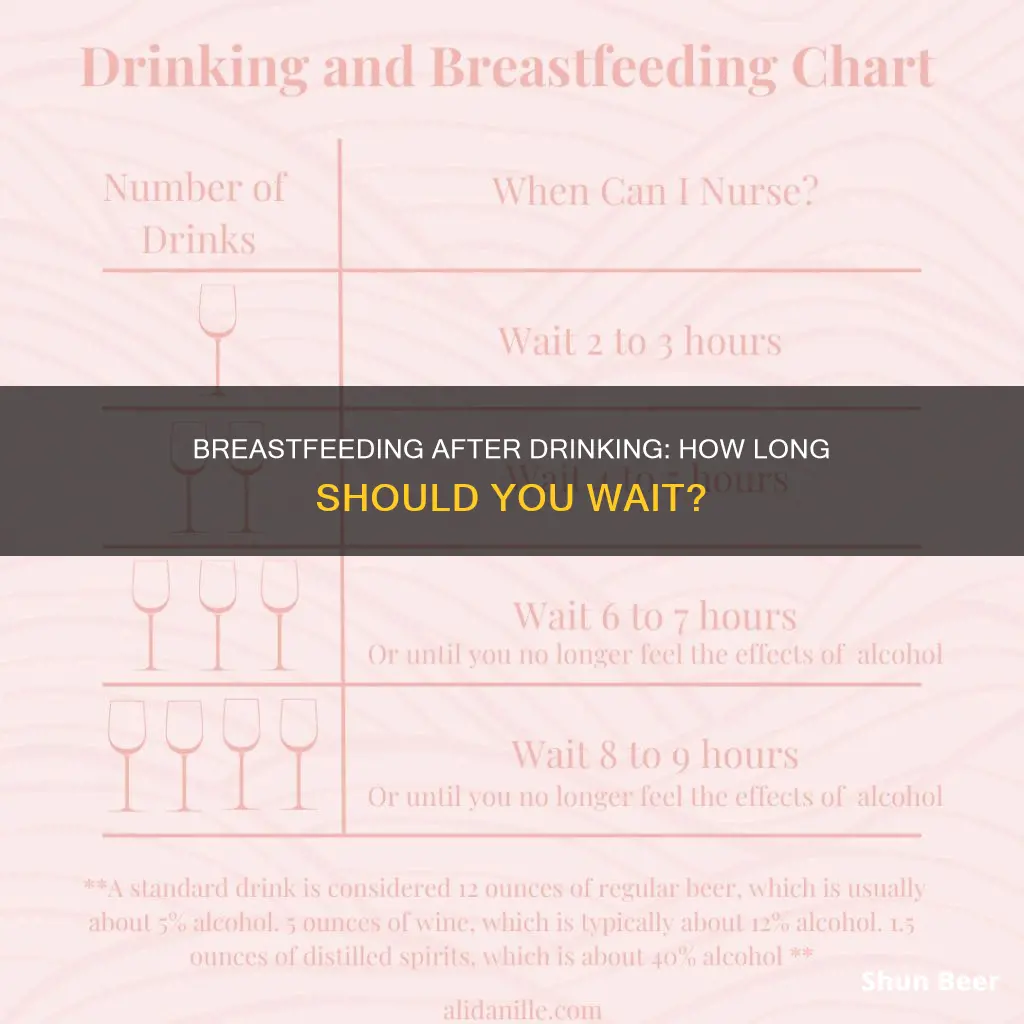
Drinking alcohol is not completely forbidden if you’re breastfeeding, but it's important to be cautious. The more you drink, the longer it takes for the alcohol to leave your breast milk. The level of alcohol in your milk mimics the amount in your blood. It is recommended to wait at least two hours for every standard drink before breastfeeding again. So, if you drink five standard beers, you should wait at least 10 hours before you breastfeed again.
| Characteristics | Values |
|---|---|
| Number of beers to wait 2 hours for | 1 |
| Number of beers to wait 10 hours for | 5 |
| Number of units of alcohol in 14 units of beer | 6 |
| Number of units of alcohol in 14 units of wine | 14 |
| Number of units of alcohol in 14 units of liquor | 7 |
| Number of hours to wait for 2 drinks | 4-5 |
| Number of hours to wait for 3 drinks | 6-8 |
What You'll Learn

How long should you wait to breastfeed after drinking?
While it is ideal to abstain from drinking alcohol while breastfeeding, it is not completely forbidden. If you do choose to drink, it is important to wait until the alcohol has left your breast milk before breastfeeding again. The amount of time this takes will depend on several factors, including the amount and strength of the alcohol consumed, your body weight, and how quickly your body metabolises alcohol.
As a general rule, it is recommended to wait at least two hours after drinking one standard drink before breastfeeding again. A standard drink is defined as:
- 12 ounces (355 milliliters) of 5% beer
- 5 ounces (148 milliliters) of 11% wine
- 1.5 ounces (44 milliliters) of 40% liquor
So, for example, if you drink five standard beers, you should wait at least 10 hours before breastfeeding again. However, this is just a rough estimate and does not take into account your weight or other individual factors.
It is important to note that pumping and dumping will not speed up the process of clearing alcohol from your breast milk. Time is the only way to do that. However, pumping and dumping can be helpful to maintain your milk supply and avoid engorgement if you are drinking over a long period or have consumed multiple drinks.
If you plan to drink, it is a good idea to have a stash of breast milk in your freezer or to pre-pump and refrigerate your breast milk beforehand. That way, you can ensure your baby still receives safe milk while you wait for the alcohol to clear from your system.
Mixing Prozac and Beer: Is It Safe to Drink?
You may want to see also

How much alcohol gets into breast milk?
The amount of alcohol that gets into breast milk depends on the amount of alcohol in the mother's bloodstream. The alcohol concentration in breast milk is similar to that in the mother's blood. This means that if a mother has a blood alcohol content (BAC) of 0.08%, her breast milk will also contain 0.08% alcohol.
According to one study, the amount of alcohol that a baby consumes through breast milk is roughly 5% to 6% of the weight-adjusted maternal dose. For example, if a 154-pound (70 kg) woman consumes four standard-sized drinks and then breastfeeds when her BAC is at its highest, her baby could potentially develop a BAC of 0.005%. This assumes the baby weighs approximately 13 pounds (6 kg) and drinks 5 ounces (150 ml) of breast milk over several feedings.
The highest amount of alcohol in breast milk occurs 30 to 60 minutes after drinking an alcoholic beverage. The concentration then gradually decreases as the body metabolizes the alcohol. The time it takes for alcohol to leave the breast milk varies depending on individual factors such as the amount of alcohol consumed, the speed of consumption, whether it was consumed with food, the mother's weight, and how quickly their body metabolizes alcohol.
While there is no known safe level of alcohol consumption during breastfeeding, occasional low to moderate alcohol consumption is generally considered acceptable by health authorities. The American Academy of Pediatrics (AAP) and the Centers for Disease Control and Prevention (CDC) recommend waiting at least two hours after consuming one drink before breastfeeding again. This allows the alcohol to metabolize and reduce its concentration in the breast milk.
The Magic of Beer Batter: Science Behind the Fizz
You may want to see also

What are the risks of drinking alcohol while breastfeeding?
While drinking alcohol while breastfeeding is not completely forbidden, it is important to be cautious and aware of the risks. Here are some of the risks associated with consuming alcohol while breastfeeding:
- Alcohol can interfere with the levels of prolactin, a hormone that helps produce milk. This can result in a decreased milk supply and delayed letdown or "milk ejection".
- Drinking alcohol while breastfeeding can disrupt the hormones linked to milk production. Studies have shown that nursing after a drink or two could decrease the baby's milk intake by 20 to 23%.
- Alcohol can impair your judgment and compromise the child's safety. It can also delay a mother's letdown and breast milk flow, and even decrease her milk supply.
- Research has found that daily drinking might result in developmental delays in infants, such as reduced motor control. Motor control helps infants sit up, crawl, and play with toys.
- Infants might experience trouble sleeping and increased agitation. A study noted that infants slept 25% less than usual after consuming alcohol in breast milk.
- Other risks for infants include decreased weight gain, future developmental problems such as trouble reasoning, and impaired immune function.
- For breastfeeding parents, alcohol can increase the time it takes to push out milk and may result in a reduced ability to care for the child.
- Alcohol can stay in breast milk for two to three hours, with the highest levels occurring 30 to 60 minutes after drinking. It is recommended to wait at least two to three hours after a single drink before breastfeeding again.
- Pumping and dumping will not speed up the process of clearing alcohol from breast milk. Time is the only way to eliminate alcohol from breast milk.
- Drinking alcohol while breastfeeding can change the taste of your breast milk, and your baby may not like it.
- Continued long-term exposure to alcohol in breast milk could have negative effects on the baby's growth, cognition, and development.
Low-Carb Beer and Atkins: What You Need to Know
You may want to see also

How long does alcohol stay in breast milk?
The length of time that alcohol can be detected in breast milk depends on how much alcohol a mother consumes. Alcohol from one drink can be detected in breast milk for about two to three hours, but this time period extends to about four to five hours if a mother consumes two drinks, and to about six to eight hours if she consumes three drinks, and so forth.
The amount of alcohol in breast milk is influenced by several factors, including:
- How fast the alcohol was consumed
- Whether it was consumed with food
- The mother's body weight
- Individual variations in alcohol absorption and metabolism
The more you drink, the longer it takes for alcohol to clear from your milk. The level of alcohol in breast milk peaks about 30-60 minutes after drinking and then gradually falls as your body works to clear it from your system.
If you choose to drink alcohol while breastfeeding, it’s best to avoid nursing again until the alcohol has completely cleared from your breast milk.
Endoscopy and Beer: What You Need to Know
You may want to see also

What are some tips for drinking alcohol while breastfeeding?
- Consider the type of drink and how many you're having: The alcohol volume in a glass of wine and a shot of tequila is not the same. The more you drink, the longer it takes for the alcohol to clear from your breast milk.
- Eat beforehand and stay hydrated: Drinking alcohol on an empty stomach increases its effects on your body. Staying hydrated is also important, as alcohol is dehydrating.
- Consider your baby's age and feeding schedule: Try to work around your baby's feeding schedule. Knowing when your baby will need their next feed will help you time your drink accordingly.
- Have a stash of breast milk: If you end up drinking more than expected, having a stash of breast milk will ensure you can still feed your baby safely.
- Pre-pump your breast milk: If you know you'll be drinking, you can pre-pump your breast milk and refrigerate it for later.
- Pump and dump: If you'll be drinking over a long period or consuming multiple drinks, pumping and dumping can help maintain your milk supply and avoid engorgement. However, remember that pumping and dumping will not speed up the process of clearing alcohol from your system.
- Wait at least two hours per drink before breastfeeding: This is a general guideline, and the specific time may vary depending on various factors such as your weight and how quickly your body metabolizes alcohol.
Vegan Beer: What's in Your Pint Glass?
You may want to see also
Frequently asked questions
You should wait for at least 10 hours. It is recommended to wait at least 2 hours for every standard drink before breastfeeding again.
Alcohol stays in breast milk for 2 to 3 hours, with the highest levels occurring 30 to 60 minutes after drinking. However, it varies from person to person and depends on factors like the amount of alcohol consumed, how quickly it was consumed, whether it was consumed with food, and how much the person weighs.
Drinking alcohol while breastfeeding can cause negative effects on the baby's development, growth, and sleep patterns. It can also impair the mother's judgment and ability to care for the child. Additionally, it can decrease milk production and the milk ejection reflex.







